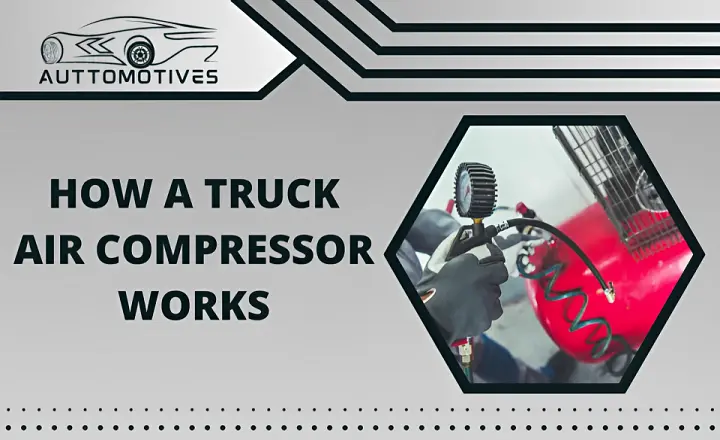How a Truck Air Compressor Works | Learn Keeping Compressor Smooth
Truck air compressors play a vital role in transportation, enabling vehicles to operate various brakes, suspension, and power steering systems. Understanding how these compressors work can help drivers maintain their trucks properly and avoid costly repairs. We will provide an in-depth guide on how a truck air compressor works and offer tips for running it smoothly. Whether you are a seasoned driver or new to the industry, read on to learn more about this critical component of your vehicle.
How a Truck Air Compressor Works?
A truck air compressor is an essential component of any heavy-duty vehicle. This device serves several purposes, including powering the pneumatic brakes, the suspension system, and other accessories that require compressed air. So how does it work?

To understand how a truck air compressor works, you must first know the basic components of this machine. There are two types of truck air compressors: reciprocating and rotary screw compressors. Reciprocating compressors use pistons to compress and release the air, while rotary screw compressors rely on two interlocking screws to generate compressed air.
Once you turn on your truck’s engine and power the compressor via a belt or a direct drive system, the compressor pulls ambient atmospheric air through an intake valve before pressuring it into a storage tank or receiver tank by reducing its volume.
Ways to keep your truck’s air compressor running smoothly:
Keeping your truck’s air compressor running smoothly ensures your vehicle is in top working condition. Regular maintenance can prolong the life of the compressor and prevent unnecessary breakdowns. One way to maintain the air compressor is by checking the oil levels regularly and changing them when necessary. This will keep the compressor lubricated and prevent overheating, which can lead to costly repairs.

Another effective way to maintain your truck’s air compressor is by keeping it clean. Over time, debris and grime can accumulate on the unit, leading to clogs or other obstructions that affect its performance. Cleaning your air compressor regularly using a damp cloth or a specialized cleaning solution will help reduce wear and tear while ensuring optimal functioning. Inspecting for leaks in hoses and fittings can help avoid pressure loss within the system, which leads to reduced efficiency overall.
Brake function:
Maintaining your truck’s air compressor is essential for ensuring its smooth and efficient functioning. The air compressor plays a vital role in the vehicle’s braking system, making it a crucial component to watch. Some ways to keep your truck’s air compressor running smoothly are:
- Check the brake function regularly to ensure the air compressor works correctly. A malfunctioning brake system can put you and other drivers at risk of accidents and mishaps. It is necessary to conduct regular checks and repairs if needed.
- Make sure that there is adequate lubrication in the air compressor’s oil reservoir. Regular maintenance of oil levels helps avoid components’ wear and tear, reduces heat buildup, and keeps the unit running smoother for longer periods.
Duty cycle:
Truck air compressors are an essential component of any heavy-duty trucking operation. They provide the power to run various pneumatic tools, such as impact wrenches and nail guns. Any machine, air compressors require regular maintenance to keep them running smoothly. The duty cycle is one key factor in maintaining your truck’s air compressor.
The duty cycle is how long an air compressor can operate continuously before needing to rest. Understanding your compressor’s duty cycle is important to prevent it from overheating and causing damage. To determine your compressor’s duty cycle, check the manufacturer’s specifications or consult a mechanic specializing in heavy-duty trucks.
One way to keep your truck’s air compressor running smoothly is by monitoring its temperature. When operating at full capacity, an air compressor generates significant heat.
Air System Control:
A truck’s air compressor is an essential component that controls the vehicle’s air system. It helps maintain proper tire pressure and ensures all brakes and other critical systems function. It is crucial to keep this vital component running smoothly. Here are a few ways to do so.
- Regular maintenance of the air compressor is crucial. This includes checking its oil level, replacing filters, and draining any moisture from the tank regularly.
- Use high-quality lubricants and oils for your compressor, which will help reduce wear on its components over time.
- Avoid overworking your compressor by ensuring it is not running unnecessarily or being used beyond its capacity limit.
To keep your truck’s air compressor running smoothly, monitor potential issues before they arise.
Air supply:
The air compressor is essential to any truck’s air supply system. It helps power the air brakes, inflate tires, and run various pneumatic tools used on a truck. If your truck’s air compressor fails, it can lead to costly repairs and downtime. This article will discuss ways to keep your truck’s air compressor running smoothly.
You need to make sure that the air compressor oil is changed regularly. The oil lubricates the moving parts inside the compressor and keeps them running smoothly. Over time, the oil can break down or become contaminated with dirt and debris. Changing the oil every 3-6 months or per manufacturer recommendations is recommended.
Check for leaks in the air supply system frequently. Leaks can put extra strain on your compressor as it has to work harder to maintain proper pressure levels. You need to know How to Trick a Mass Airflow Sensor | 5 Techniques Explained
Normal braking:
Truck drivers understand the importance of an air compressor. It’s what powers their brakes, horns, and other essential systems. Without it, a truck cannot function properly and compromise driver safety. It’s crucial to keep your air compressor running smoothly at all times.
Normal braking is one of the easiest ways to maintain your air compressor. By using this method whenever possible, you can avoid wearing out the system unnecessarily. When you need to slow down or stop your truck, ease off the accelerator slowly and allow for natural braking instead of always relying on your brake pedal. This way, you’ll reduce the stress on your air compressor each time you use it.
Regular maintenance checks are another key factor in keeping your air compressor running smoothly. Start by checking for leaks in hoses or valves and ensure they are correctly connected without loose parts or fittings.
Vehicle parking:
As a truck owner, you rely heavily on your vehicle’s air compressor to keep your tires inflated and other equipment operating efficiently. Like any mechanical component, the air compressor can suffer from wear and tear over time, leading to malfunctions that can cause significant problems in the long run. The good news is that with proper maintenance practices, you can extend the lifespan of your truck’s air compressor and keep it running smoothly for years to come.
One of the most important things you can do to ensure your air compressor’s longevity is to park your vehicle in a clean and dry location whenever possible. Moisture and dirt are among the top culprits behind air compressor issues, as they can rust or clog essential components. If you need to park outdoors for an extended period, consider using a protective cover or parking under a canopy or garage.
Air pressure gauges:
The air compressor is one of the most important components in your truck’s air brake system. It compresses air into the tanks, which powers the brakes. Without a functioning air compressor, your truck can’t stop effectively, leading to accidents on the road. It’s crucial to keep this component running smoothly.
One way to ensure that your truck’s air compressor works correctly is by regularly checking its air pressure level using an air pressure gauge. Every time you check your tire pressure, take a few extra seconds to check the pressure in your truck’s tanks too. By doing so, you’ll be able to spot any sudden drops or unusual readings and address them before they develop into more severe issues.
Another way to maintain your truck’s air compressor is by regularly draining moisture from its tank.
Conclusion:
How a Truck Air Compressor Works? A truck air compressor is an essential component of any heavy-duty vehicle. It converts mechanical energy into compressed air, powering various tools and equipment. By understanding how it works and the different types available, you can make informed decisions when selecting the right compressor for your needs. Regular maintenance is also crucial to ensure optimal performance and longevity. Your truck air compressor will continue to provide reliable service for years.
FAQ’s
What is an air compressor?
An air compressor is a device used to increase the air pressure in an area. This is often done to increase the airflow through an engine or to create a higher pressure for use in hydraulic systems.
What are the benefits of using a truck air compressor?
There are several benefits to using a truck air compressor, including the ability to quickly and easily fix small repairs, increase productivity on job sites, and reduce the need for overtime. Truck air compressors are versatile tools that can be used for various tasks, such as inflating tires, repairing broken equipment, and creating pressure in water tanks.
What are the steps involved in using an air compressor?
To use an air compressor, follow these steps:
Turn on the power to the air compressor.
Connect the air compressor to the power source (usually a wall outlet).
Open the air compressor’s cover and place the item you wish to compress on the work surface inside the compressor.







